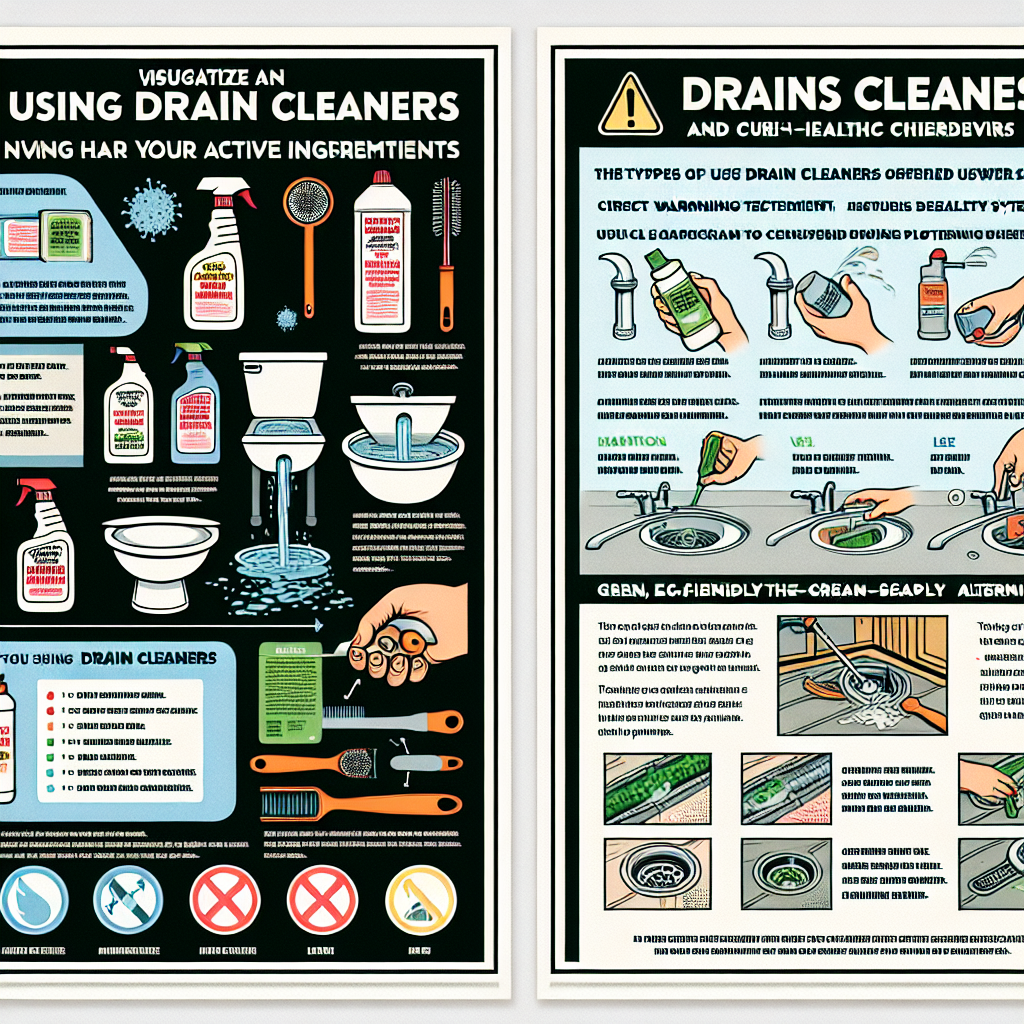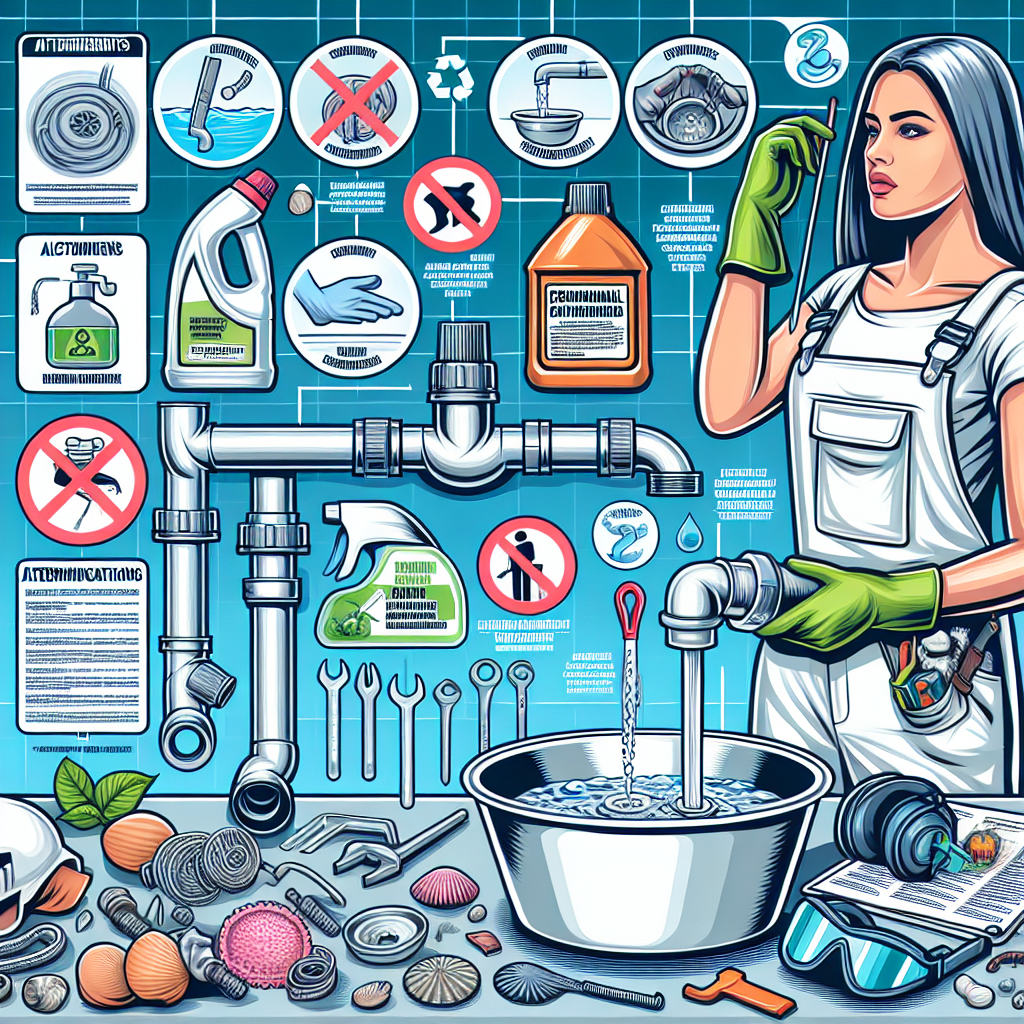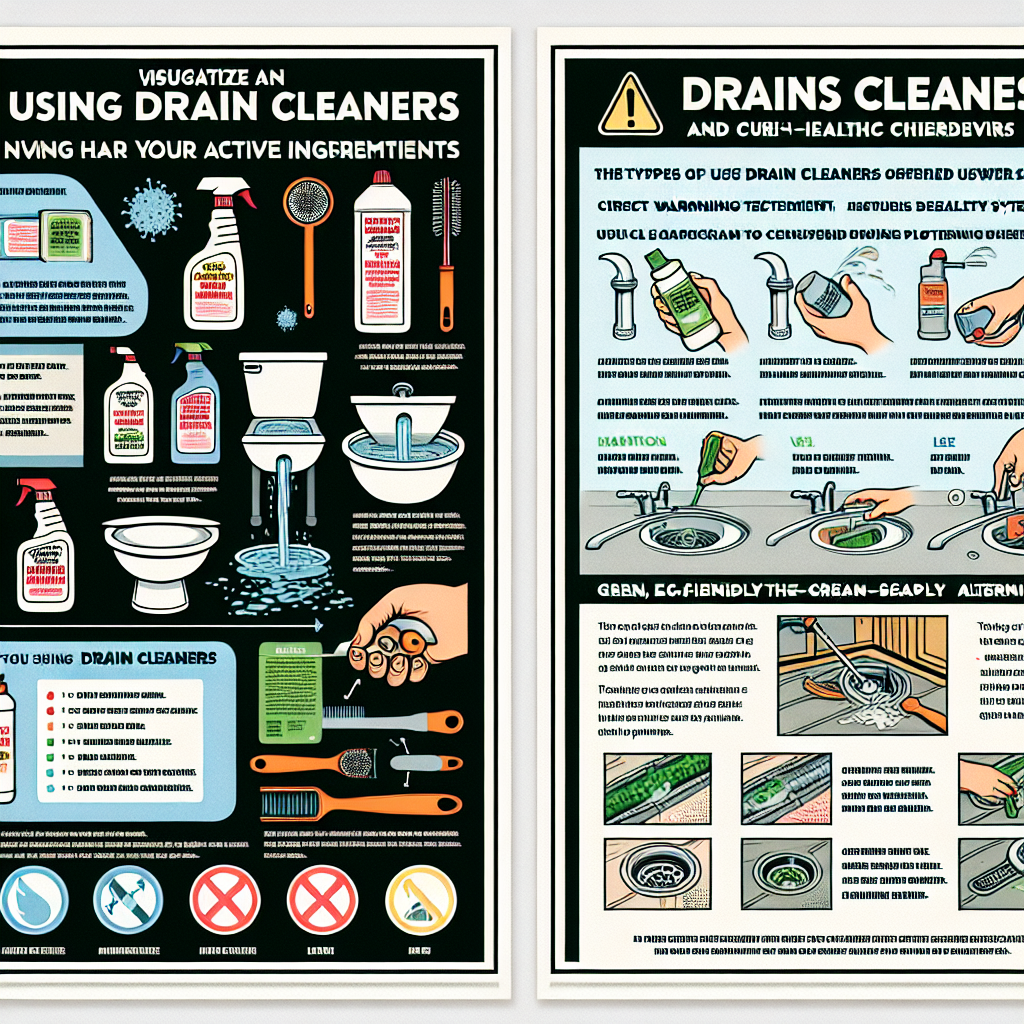Are clogged drains causing you headaches? Look no further than our comprehensive Guide to Safe and Effective Use of Drain Cleaners. In this article, we will provide you with essential tips and advice to help you solve your drain problems effortlessly. From choosing the right drain cleaner to understanding safety precautions, we’ve got you covered. Say goodbye to pesky clogs and hello to hassle-free drainage with our step-by-step guide. Your drains will thank you!

Choosing the Right Drain Cleaner
When it comes to choosing the right drain cleaner for your plumbing system, it’s essential to understand the different types available in the market. The two most common types of drain cleaners are chemical-based and enzymatic.
Chemical drain cleaners are typically made of strong and corrosive chemicals that dissolve and break down clogs. These cleaners are often effective in clearing stubborn blockages but can be harsh on your plumbing system if not used correctly.
Enzymatic drain cleaners, on the other hand, are made up of natural enzymes that digest organic materials causing the clogs. These cleaners are generally safer to use and are more environmentally friendly.
When selecting a drain cleaner, consider the severity of the clog, the type of pipes in your plumbing system, and your personal preferences. Taking these factors into account will help you choose the right drain cleaner that effectively clears the clog without causing damage to your plumbing system.
Considering Safety Precautions
Safety should always be a top priority when using drain cleaners. Regardless of the type of drain cleaner you choose, there are some important safety precautions you should keep in mind.
Firstly, always read and follow the manufacturer’s instructions thoroughly. Each drain cleaner may have specific usage guidelines that must be adhered to. These instructions will guide you on the necessary protective measures and steps to take while using the product.
Secondly, ensure that you are using the appropriate protective gear. Chemical-based drain cleaners can be hazardous to your skin and eyes, so wearing protective gloves, goggles, and clothing is crucial. Enzymatic drain cleaners are usually less harmful but it’s still a good idea to protect yourself.
Lastly, remember to store drain cleaners properly. Keep them out of reach of children and pets, and ensure that they are stored in a cool and dry place away from direct sunlight. Proper storage reduces the risk of accidental exposure and extends the shelf life of the product.
Checking Compatibility with Your Plumbing System
Before applying any drain cleaner, it’s essential to determine its compatibility with your plumbing system. Different types of pipes may react differently to certain drain cleaners, which can result in damage to the pipes or even cause leaks.
To check compatibility, review the product label or instructions for any information regarding the types of pipes the drain cleaner is suitable for. If in doubt, consult with a professional plumber who can provide guidance based on your specific plumbing system.
Taking the time to ensure compatibility will help prevent any potential damage to your pipes and plumbing system, saving you from costly repairs in the future.
Understanding Types of Drain Blockages
To effectively tackle drain blockages, it’s important to understand the different types and common causes.
Identifying Common Causes of Drain Blockages
Drain blockages can occur due to various factors. The most common causes include the buildup of hair, soap scum, food particles, grease, and foreign objects like toys or toiletries. Identifying the cause of the blockage can help you choose the most appropriate method for clearing it.
Differentiating Between Partial and Complete Blockages
Blockages can be either partial or complete. Partial blockages result in slow drainage, while complete blockages completely prevent water from flowing down the drain. Understanding the severity of the blockage will help you determine the best approach for clearing it.
Knowing When to Seek Professional Help
While many minor blockages can be cleared using drain cleaners or DIY methods, there are instances where it’s best to seek professional help. If you’ve tried multiple methods without success, the blockage is severe, or if you have an older or fragile plumbing system, it’s advisable to call a professional plumber. They have the expertise and tools necessary to resolve more challenging blockages without causing further damage.

Precautions before Using Drain Cleaners
Before applying any drain cleaner, there are some precautions you should take to ensure your safety and the effectiveness of the product.
Protective Measures for Yourself
Always protect yourself before using drain cleaners. Put on protective gloves, goggles, and clothing to prevent any contact with your skin or eyes. Chemical drain cleaners can be particularly harmful, so taking these precautionary measures is essential.
Removing Excess Water from the Drain
To enhance the effectiveness of the drain cleaner, it’s recommended to remove any excess water from the drain. Use a plunger or pour boiling water down the drain to clear any standing water before applying the drain cleaner. This will allow the cleaner to directly reach the clog and work more efficiently.
Testing the Drain Cleaner on a Small Area
Before applying the drain cleaner to the clogged drain, it’s a good idea to test it on a small, inconspicuous area. This will help ensure that the cleaner does not cause any adverse reactions or damage to your plumbing fixtures or surfaces. Follow the instructions on the product label for the test and wait for the designated amount of time before proceeding.
By taking these precautions, you can minimize the risks associated with using drain cleaners and increase the chances of successfully clearing the blockage.
Safe Handling and Storage of Drain Cleaners
Proper handling and storage of drain cleaners are crucial to ensure the safety of your household members and prolonged effectiveness of the product.
Reading and Following Manufacturer’s Instructions
Before using any drain cleaner, carefully read and follow the manufacturer’s instructions. Pay attention to the recommended dosage, application method, and safety precautions. Each drain cleaner may have specific instructions, so it’s important to follow them closely for optimal results.
Using Protective Gear
As mentioned earlier, wearing protective gear while handling drain cleaners is essential for your safety. Always wear gloves, goggles, and appropriate clothing to protect your skin and eyes from any potential harm. This is especially important when dealing with chemical-based drain cleaners as they can be corrosive.
Storing Products Properly to Minimize Risks
Proper storage of drain cleaners is essential to prevent accidents and maintain their effectiveness. Store them in their original containers with tight lids to avoid leakage. Keep them out of reach of children and pets in a high, locked cabinet. Additionally, store them in a cool, dry place away from direct sunlight and other household chemicals.
By following these proper handling and storage practices, you can ensure the longevity of your drain cleaners and minimize the risks associated with their use.
Applying Drain Cleaners Safely
When it comes to applying drain cleaners, it’s important to be mindful of certain dos and don’ts to ensure your safety and the effectiveness of the product.
Dos and Don’ts of Pouring Drain Cleaners
Do follow the dosing instructions provided by the manufacturer. Using more than the recommended amount may not yield better results and can potentially damage your pipes.
Don’t mix different drain cleaning products together. Mixing different chemicals may result in reactions that could be hazardous to your health and cause damage to your plumbing system.
Do use drain cleaners when the room is well-ventilated. Proper ventilation helps in dispersing any fumes that may be released during the cleaning process.
Don’t pour drain cleaners directly into a toilet bowl. Instead, pour them directly into the drain to target the clog. Pouring drain cleaners into the toilet bowl can cause damage to the porcelain and the internal components of the toilet.
Avoiding Contact with Skin and Eyes
While using drain cleaners, it’s crucial to avoid any contact with your skin and eyes. This is especially important when using chemical-based drain cleaners. In case of accidental exposure, rinse the affected area immediately with plenty of water and seek medical attention if necessary.
Taking Precautions with Chemical Reactions
Some chemical drain cleaners generate heat or release gases during the cleaning process. To prevent any accidents, ensure that your plumbing system is properly vented and avoid leaning over the drain when applying the cleaner. If you notice any unusual reactions, such as excessive heat or fumes, discontinue use and consult with a professional plumber.
By following these safe practices, you can apply drain cleaners effectively while minimizing any potential risks to yourself and your plumbing system.
Dealing with Specific Drain Issues
Different drains in your home may require different approaches when it comes to effectively clearing blockages. Here are some tips for dealing with specific drain issues.
Clogs in Kitchen Sinks
Kitchen sinks often get clogged with food particles, grease, and oil buildup. To address these clogs, start by removing any visible debris from the sink using a plunger or gloved hand. You can also try pouring boiling water down the drain to clear any greasy residue. If the clog persists, use a drain cleaner specifically designed for kitchen sinks, following the manufacturer’s instructions.
Blockages in Bathroom Drains
Bathroom drains, including those in the shower, bathtub, and sink, can become clogged with soap scum, hair, and other bathroom products. Begin by removing any visible debris using a glove or drain snake. For stubborn clogs, apply an appropriate drain cleaner, preferably one designed for bathroom use. Ensure proper ventilation and follow the instructions on the product label for best results.
Clearing Outdoor and Basement Drains
Outdoor and basement drains are susceptible to debris, leaves, and other outdoor elements. Before using drain cleaners, remove any visible debris or blockages manually. This can often be done by using a plumber’s snake or a pressure washer. Once the visible debris is cleared, apply a suitable drain cleaner to dissolve any remaining buildup.
Remember to always consider the specific needs of each type of drain to effectively clear blockages and restore proper drainage to your plumbing system.
Alternative Methods for Clearing Drains
If you prefer to explore alternative methods for clearing drains or want to avoid using chemical-based drain cleaners, here are some options to consider.
Using Natural Drain Cleaners
Natural drain cleaners can be an effective and eco-friendly alternative to chemical-based cleaners. Ingredients like baking soda, vinegar, and lemon juice can be combined to create a foaming reaction that helps break down clogs. These natural cleaners are generally safe to use and do not pose significant risks to your plumbing system or the environment.
Utilizing Homemade Drain Cleaning Solutions
Homemade drain cleaning solutions can also be effective in clearing minor blockages. For example, a mixture of baking soda and hot water can help dislodge debris, while a mixture of salt and boiling water can target grease buildup. These solutions are readily available in most households and are a cost-effective option for regular maintenance.
Exploring Mechanical Drain Cleaning Tools
Mechanical drain cleaning tools, such as drain snakes or augers, can also be used to clear stubborn blockages manually. These tools allow you to physically remove debris or break apart clogs using a rotating mechanism. They are especially useful for blockages that cannot be easily cleared using drain cleaners alone.
By considering these alternative methods, you can prioritize natural and homemade solutions while effectively maintaining your drains without relying solely on chemical-based cleaners.
Post-Cleaning Maintenance and Care
Once you have successfully cleared a drain blockage, it’s essential to take proactive measures to prevent future clogs and maintain the health of your plumbing system.
Rinsing the Drain Properly
After using a drain cleaner or alternative method, rinse the drain thoroughly with hot water. This will help remove any residual debris and ensure that your pipes are clean and clear.
Preventing Future Clogs
To prevent future clogs, there are several preventive measures you can take. Use drain screens or stoppers to catch hair, food particles, and other debris before they enter the drain. Regularly clean these screens to prevent buildup. Avoid pouring grease or oil down the drain, and dispose of them in a separate container instead. Additionally, run hot water down the drain after each use to help flush away any potential residue.
Regular Inspections and Maintenance
Regularly inspect your drains for signs of buildup or clogs. If you notice slow drainage, foul odors, or recurring clogs, address these issues promptly. Consider scheduling regular maintenance with a professional plumber to ensure that your plumbing system remains in optimal condition.
By following these post-cleaning maintenance and care practices, you can minimize the chances of future clogs and maintain the efficiency of your drains.
Common Mistakes to Avoid
To ensure safe and effective use of drain cleaners, it’s important to avoid common mistakes that can lead to damage or ineffective results.
Mixing Different Drain Cleaning Products
Never mix different drain cleaning products together. Chemical reactions between different ingredients can be highly unpredictable, leading to hazardous outcomes. Stick to a single drain cleaner and follow the manufacturer’s instructions.
Overusing Drain Cleaners
Using excessive amounts of drain cleaner does not guarantee better results. In fact, overuse can damage your pipes, especially if you have older or fragile plumbing. Stick to the recommended dosage and avoid excessive or unnecessary applications.
Neglecting Safety Precautions
Always prioritize safety when using drain cleaners. Wear protective gear, follow the instructions carefully, and ensure proper ventilation. Neglecting safety precautions can lead to accidents, injuries, or exposure to harmful chemicals.
By avoiding these common mistakes, you can ensure the safe and effective use of drain cleaners while protecting your plumbing system and maintaining its longevity.
When to Call a Professional Plumber
While many drain blockages can be resolved with the use of drain cleaners or alternative methods, there are situations where it’s best to call a professional plumber.
Persistent and Severe Blockages
If you’ve tried multiple methods without success, or if the blockage is persistent and severe, it’s advisable to seek professional assistance. Professional plumbers have the experience, knowledge, and specialized tools to tackle challenging blockages effectively.
Old or Fragile Plumbing Systems
If you have an older plumbing system or pipes that are fragile, it’s best to leave the job to the professionals. Improper handling or the use of harsh drain cleaners can cause further damage to the pipes, leading to costly repairs.
Recurring Drain Problems
If you experience recurring drain problems, continuously clearing the same clog, it’s a sign of an underlying issue. A professional plumber can identify the root cause of the problem and provide a long-term solution.
By knowing when to call a professional, you can avoid unnecessary damage and ensure that your plumbing system is properly taken care of.
In conclusion, choosing the right drain cleaner is crucial for the safe and effective clearing of blockages in your plumbing system. Understanding the different types of drain blockages, taking necessary precautions, and considering alternative methods can help you maintain the health of your drains. By following proper post-cleaning maintenance, avoiding common mistakes, and seeking professional help when needed, you can ensure the longevity and efficiency of your plumbing system. Remember, a well-maintained plumbing system leads to a healthier and happier home.

